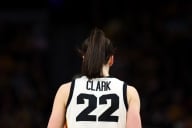You have /5 articles left.
Sign up for a free account or log in.
The governing board of the National Collegiate Athletic Association's Division I conferences will not adopt rules that would have allowed it to punish institutions that engage in egregious academic fraud.
The prospective policy change followed widespread and withering criticism of the NCAA for declining to penalize the University of North Carolina at Chapel Hill, which created fake classes that largely benefited athletes for nearly two decades.
The NCAA said it could not definitively prove the “shadow” courses in the department of African and Afro-American studies had been set up solely to boost the grade point averages of athletes and keep them eligible to play. They noted that nonathletes took the classes as well.
NCAA rules allow institutions to decide if academic fraud occurred on their campuses. When the association was investigating UNC, university administrators insisted the classes were legitimate, which ultimately allowed UNC to escape punishment.
But university officials reversed course in 2014 and admitted that academic misconduct did occur. The position change was partially prompted by an investigative report from the law firm Cadwalader, Wickersham & Taft, which outlined how the fake classes lasted from 1993 to 2011. Nearly 3,100 students enrolled in the courses, which had no instruction and were largely graded by a secretary on campus.
The NCAA was called out for being toothless after UNC dodged sanctions by taking advantage of the loophole in the rules. Multiple groups called on NCAA representatives to revise their policies on academic fraud. Among them was an NCAA panel led by Condoleezza Rice, former U.S. secretary of state and Stanford University provost. The so-called Rice Commission was mostly charged with making recommendations on how to reform men’s college basketball after a pay-for-play scheme was uncovered, but the commission also suggested the NCAA clarify its academic fraud policies.
The NCAA created a six-member working group months after the UNC decision that eventually recommended the association pass a bylaw that gave it broader authority to punish institutions that engage in academic fraud. The working group was headed by Carol Cartwright, former president of Kent State University and Bowling Green State University and co-chair of the Knight Commission on Intercollegiate Athletics, which advocates for academic integrity in college sports. The Knight Commission also pushed for new academic reform rules.
A prospective bylaw was also endorsed by the Division I Presidential Forum, which is made up of college presidents and chancellors who advise the Board of Directors, the governing body of the Division I conferences.
Division I conferences, which include the Big 10, Atlantic Coast and Southeastern Conference, are the major NCAA leagues.
The Board of Directors decided last month not to back the proposal, which was a bylaw intended to apply in cases of egregious academic misconduct, NCAA spokeswoman Michelle Hosick wrote in an email.
The board's action means the bylaw will not be voted on by the larger NCAA membership. The NCAA had not determined specific actions that would have triggered the sanctions imposed by the bylaw, only that it would be used in rare circumstances.
“Governance bodies and much of the membership as a whole were uncomfortable with the concept at this time,” Hosick wrote in her email, declining to specify the reasons for their discomfort.
The Board of Directors did support mild changes in academic reform policies at its meeting last month, including “emphasizing a school’s role in determining violations of its own policies regarding academic honesty and integrity in the process of applying NCAA rules,” according to an NCAA statement.
“Today’s action is appropriate because it places the onus on individual campuses to preserve academic integrity,” Eli Capilouto, chairman of the Board of Directors and president of the University of Kentucky, said in a statement after that meeting.
College sports experts have said that the NCAA membership wants to make sure institutions are in charge of identifying and reporting academic fraud. The NCAA is primarily an athletics body; colleges and their faculties tend to want autonomy in academic matters.
University presidents who sit on NCAA governing boards have dual loyalties, said Walter Harrison, president emeritus of the University of Hartford, a Knight Commission member and former chairman of the NCAA’s top governing board. They must think both of the NCAA's reputation and what's best for their institutions, he said.
Harrison said presidents may have felt the bylaw interfered with institutional control of academics, but he said he was personally disappointed they did not act more decisively.
The UNC case demonstrated that “what the NCAA has on the books is not adequate,” he said. “It does not put the NCAA in a particularly good light.”
The NCAA’s reluctance to move forward on the bylaw drew significant criticism. Dave Ridpath, the president of the Drake Group, another advocacy organization focused on preserving academics in college sports, said college presidents in NCAA governance had chosen to “enable academic fraud.”
“It was timid, spineless, defensive, protective of the status quo and fully supportive of the public view that college presidents are incapable of controlling renegade coaches and undersupervised tutors, learning specialists and athletic academic advisers at their institutions,” Ridpath said in a written statement. “College and university presidents are fully aware that they have already sold out academic integrity to commercialized college sport.”








